Don’t Risk It: Things You Should Never Tow Behind Your Car
February 23, 2023
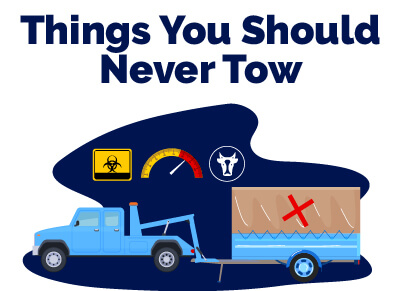

I am a serial entrepreneur and a consumer advocate. When I’m not helping car buyers, I love working on ventures that have a positive impact.
I run a cause marketing agency and serve on the board of Vayu Global Health where we are disrupting the medical industry and preventing the needless deaths of mothers and babies during childbirth.
As a team of experts who have extensively researched and tested various car models, we have gained extensive knowledge and experience on the subject of towing. We understand the potential dangers and risks associated with it.
There are several things that can put your safety and that of others at risk if you attempt to tow them with your vehicle. As such, we have compiled a comprehensive list of items that should never be towed behind a car.
Table of Contents
Overweight Items
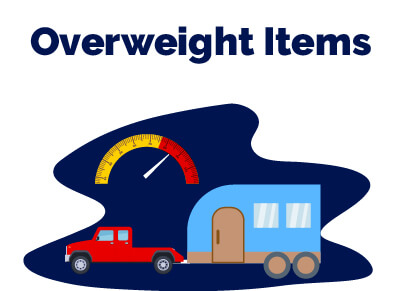 Knowing the maximum weight that can safely be towed by your vehicle will help ensure that you don't overload it and cause damage or an accident. It's also important to consider what type of trailer you are using; for example, a flatbed trailer may have different weight restrictions than a utility trailer.
Knowing the maximum weight that can safely be towed by your vehicle will help ensure that you don't overload it and cause damage or an accident. It's also important to consider what type of trailer you are using; for example, a flatbed trailer may have different weight restrictions than a utility trailer.
Weight distribution is another factor when loading items onto a trailer. Properly distributing the load helps maintain balance and stability while driving, which reduces strain on both the car and its occupants. When loading heavier items onto a trailer, try to place them as close as possible to where they will be attached in order to reduce stress on other parts of the vehicle. Additionally, make sure all loads are secured with ratchet straps or tie-downs so they won't shift during transit.
Key Takeaway: It is important to be aware of your vehicle's maximum towing capacity, the type of trailer you are using, and proper weight distribution.
Oversized Items
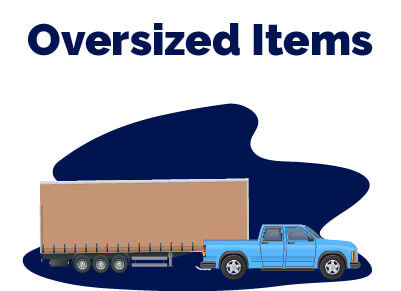 When towing oversized items behind your car, it is important to be aware of length and width restrictions, as well as height restrictions, for visibility purposes.
When towing oversized items behind your car, it is important to be aware of length and width restrictions, as well as height restrictions, for visibility purposes.
Length and Width Restrictions
Depending on the size of the item you are trying to tow, there may be a limit on how long or wide it can be. This is especially true if you plan on taking your vehicle onto public roads.
Most states have laws that regulate the maximum dimensions for any trailer being towed by a motor vehicle. It’s important to check with local authorities before attempting to tow an oversized item in order to avoid any fines or penalties.
Height Restrictions
Height restrictions also apply when transporting large items behind your car. The overall height of the load must not exceed 13 feet, 6 inches from ground level, in order for it to remain legal while traveling down public roads. If necessary, some vehicles can be equipped with adjustable hitches, which will allow them to accommodate taller loads than what would normally be allowed under standard regulations.
When transporting larger items, make sure that they do not obstruct your view out of either side mirror or block headlights/taillights from functioning properly while driving at nighttime hours.
Key Takeaway: When towing oversized items, make sure they adhere to length and width restrictions, as well as height restrictions, for visibility purposes. Adjustable hitches can help accommodate taller loads, but the overall height must not exceed 13 feet 6 inches from ground level. Additionally, ensure that your load does not obstruct your view or block headlights and taillights from functioning properly.
Loose or Unsecured Items
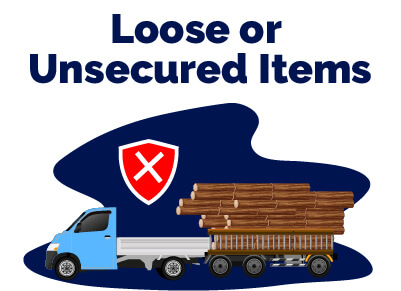 Ratchet straps and tie-downs are essential for keeping the load from shifting or becoming unbalanced during transport. This will help prevent damage to the vehicle or trailer hitch.
Ratchet straps and tie-downs are essential for keeping the load from shifting or becoming unbalanced during transport. This will help prevent damage to the vehicle or trailer hitch.
Securing Loads Properly
Before loading any item onto a trailer, make sure that it is secured with ratchet straps and/or tie-downs. The straps should be tight enough so that they don’t slip off but not too tight, as this can cause damage to the cargo itself.
Make sure all the buckles are securely fastened before you start driving.
Use of Ratchet Straps and Tie-Downs
Ratchet straps come in various sizes depending on what type of cargo you are hauling and how much weight it has. It is important to use the correct size strap for each item in order to ensure maximum safety while transporting your goods.
Tie-downs can also be used when necessary; however, these should only be used if there isn’t an option for using ratchets due to space constraints or other factors, such as weather conditions, which could affect their effectiveness over time.
When securing loads, always keep in mind that any excess slack can cause movement, which may lead to damage either directly or indirectly through wear and tear on components such as brakes, suspension systems, tires, etc.
If possible, try not to exceed the manufacturer's recommended capacity ratings for both gross vehicle weight (GVW) and tongue weight (TW).
Key Takeaway: When towing items, always secure them properly with ratchet straps andor tie-downs. Make sure the buckles are securely fastened and check regularly for signs of loosening or fraying straps. Exceeding GVW or TW ratings can lead to damage, so try not to exceed these limits.
Hazardous Materials
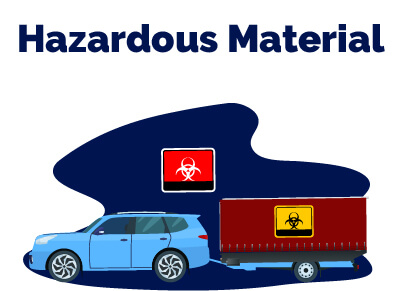 Before transporting any hazardous materials such as flammable liquids or gases, corrosive substances like acids or bases, and radioactive materials like uranium ore or nuclear waste products, it is important to check local laws.
Before transporting any hazardous materials such as flammable liquids or gases, corrosive substances like acids or bases, and radioactive materials like uranium ore or nuclear waste products, it is important to check local laws.
These items must meet specific safety requirements and may require special permits for transport, depending on the location.
Flammable Liquids and Gases
Flammable liquids and gases should always be transported in an approved container designed for this purpose. Gasoline cans should never exceed five gallons of capacity, while propane tanks must meet specific safety standards set by the Department of Transportation (DOT).
It’s also important to ensure that all flammables are kept away from open flames or sparks; even static electricity has been known to cause fires when handling combustible materials.
Corrosive Substances
Corrosive substances such as acids and bases can cause severe burns on contact with skin or clothing. Always wear protective gloves when handling corrosives, as well as eye protection if splashing is possible. Make sure any containers holding corrosives are securely closed at all times; even small amounts of acid or base can quickly eat through plastic bags or cardboard boxes.
Additionally, keep any corrosives away from other flammables; mixing them together could create dangerous chemical reactions which could result in fire or explosion hazards.
Radioactive Materials
When transporting radioactive material in a vehicle, make sure it is placed far enough away from passengers that there will not be direct exposure during transport, preferably inside a lead-lined box secured firmly within the trunk area of the car.
Key Takeaway: When towing hazardous materials behind your car, it is essential to take the necessary precautions: wear protective gear when handling corrosives; keep flammables in approved containers and away from open flames; and transport radioactive material securely in a lead-lined box.
Best Car Deals by Category
Frequently Asked Questions
What should you not do when towing?
Do not exceed the maximum weight limit for either, as this can cause damage to your vehicle or trailer, as well as create a dangerous situation on the road. Avoid sudden stops or turns while driving with a trailer; take extra care when maneuvering around corners or merging onto highways. Lastly, do not drive faster than posted speed limits when towing; excessive speeds can lead to an accident due to decreased control over your vehicle and trailer combination.
How do I protect my transmission while towing?
You should use a transmission cooler if possible. This will help keep the temperature of the fluid in the transmission lower and reduce strain on the system. Additionally, make sure that your vehicle is properly equipped for towing with an appropriate hitch and trailer brakes.
Is it OK to tow an automatic car in neutral?
It is generally not recommended to tow an automatic car in neutral. This is because the transmission and other internal components are still connected, meaning that when the car is towed, it can cause damage to these parts due to the sudden jerking motion of being pulled along.
What must you keep in mind when towing a trailer?
Make sure that your vehicle has enough power and capacity to safely tow the load. Additionally, check that all safety equipment, such as brakes, lights, hitch pins, and couplers, are properly connected before starting out on your journey. Pay attention to how you drive when pulling a trailer - avoid sudden stops or turns, as this can cause instability for both vehicles involved. Lastly, always be aware of other drivers around you; they may not realize you have an extra load behind you, so give yourself plenty of space when making maneuvers.
Posted in Uncategorized |




